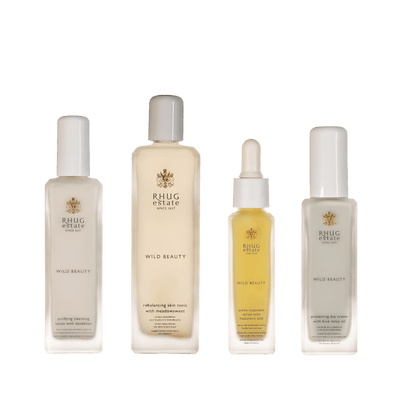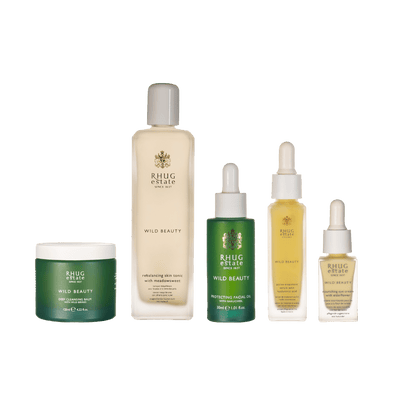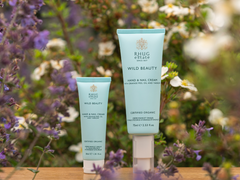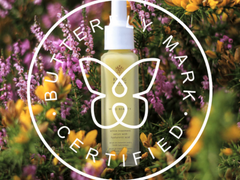Skin tells the story of how we live — the laughter, the weather, the years — beneath every expression and every change lies collagen, the protein that holds it all together. As time and stress begin to deplete what nature built, supporting the skin’s own rhythm becomes an act of care.
Collagen can’t stop the clock, but it can help skin move gracefully with it.
Introduction: The Beauty of Collagen in Natural Skincare
Collagen is the structure beneath softness. It gives skin its spring, its firmness, and the supple texture that feels alive. When we talk about natural skincare, we’re really talking about protecting that foundation. Gentle, consciously formulated products can help the skin sustain what age and environment quietly wear away.
Natural ingredients tend to work in harmony with human skin physiology. They encourage the body’s ability to renew and strengthen its connective tissues without harsh disruption. That balance is where the beauty lies — a routine that respects both science and soil.
Understanding Collagen: The Protein Behind Skin Strength
Collagen makes up most of the protein in the skin and accounts for a large share of our connective tissue. It acts like a woven framework, providing structure to everything from blood vessels to elastic cartilage.
With time, the body produces less collagen due to things like exposure to sunlight, stress, and poor rest can also decrease collagen production. When that happens, the fibres that once kept skin firm start to loosen, leading to fine lines and a loss of bounce.
Understanding how collagen behaves helps explain why consistent nourishment both inside and out is key. Collagen biosynthesis slows naturally, but there are ways to support collagen production that feel simple and attainable.
How to Add Collagen to Skin Through Daily Care
Adding collagen to the skin is about creating the right conditions for renewal. Daily cleansing, gentle exfoliation to lift dead skin cells, and hydration all play a part.
Topical formulations rich in peptides, vitamin C, and hyaluronic acid help the skin stay receptive. These nutrients fuel the enzymes responsible for collagen synthesis, keeping skin hydration balanced and skin elasticity intact.
Think of it as a partnership between what your body already knows how to do and what you feed it through both routine and diet. The body’s collagen network responds best to steady, mindful care.
The Science Behind Amino Acids and Collagen Formation
Collagen’s story begins with amino acids, those tiny building blocks that link together to form the long, sturdy chains known as collagen fibres. The main amino acids are glycine, proline, and hydroxyproline, each giving collagen its strength and flexibility.
When a topical formulation or nutrient source provides these amino acids, the body can more easily support collagen growth. The process of collagen biosynthesis depends on this foundation. Without enough amino acid content in the diet or skincare actives that complement it, the body’s collagen simply can’t be replenished effectively.
Nature offers many sources, from plant-based proteins to nutrient-rich oils, that nurture skin cells and connective tissue alike.
Shop Natural Body Scrubs
Collagen Peptides and Modern Natural Skincare
Collagen peptides have become a quiet hero in skincare science. These short chains of amino acids are easier for the skin and body to use. Hydrolysed collagen, also known as collagen hydrolysate, breaks down the larger protein so it can penetrate or absorb more efficiently.
-
How Collagen Peptides Work on the Skin
When applied topically, specific collagen peptides send a signal that tells the skin to produce collagen on its own. It’s less about replacing what’s gone and more about reminding the skin how to restore collagen naturally.
In thoughtfully made collagen skincare, you’ll often find peptides paired with botanical extracts that protect against oxidative stress. These actives work in harmony to keep the skin’s framework steady and smooth, slowing the signs of time in a natural way.
Everyday Ways to Boost Collagen Production Naturally
Supporting collagen doesn’t have to be complicated. It’s more about quiet consistency and what you do every day that keeps the skin’s rhythm steady.
-
Topical Collagen Skincare and Botanical Support
Topical collagen application is one of the simplest ways to support the body’s collagen. Look for skin creams with ingredients that help repair and strengthen the skin barrier: rosehip for its antioxidant properties, sea buckthorn for vitamin-rich nourishment, and plant oils that improve skin condition and texture.
When paired with hydrolysed collagen supplements or serums containing hyaluronic acid, these natural formulas help maintain moisture and protect against environmental stressors that can break down collagen in the skin.
-
Lifestyle Habits that Boost Collagen Production
A healthy diet filled with protein-rich foods (leafy greens, berries, citrus fruits, and seeds) supplies the body with the amino acids it needs for collagen synthesis. Hydration is equally essential. Even mild dehydration can slow the enzymes that build collagen fibrils.
Sleep, stress reduction, and movement all feed the same cycle. The human body heals and regenerates best when given rest and balance. Skincare is most effective when those foundations are in place.
-
Collagen Levels and the Ageing Process
By our mid-twenties, collagen levels begin to decline. The process feels subtle at first, then gradually becomes visible as fine lines or dryness. As skin matures, it naturally makes less collagen and loses some of its inner strength. The aim is to support that structure so it stays firm for longer. Supporting it with natural nutrients and top-quality skincare helps maintain elasticity and restore collagen before the loss becomes noticeable. The earlier the care, the smoother the journey.
The Link Between Bone Broth and Skin Vitality
Bone broth is one of the oldest ways to encourage collagen intake through food. Slow-cooked bones release gelatin, minerals, and amino acids that feed joint and skin health from within. It’s a natural form of collagen supplementation that many cultures have valued for generations.
Warm, savoury, and nutrient-dense, it can be part of a balanced diet that complements external care.
-
Plant-Based Alternatives to Bone Broth
For those who prefer not to use animal sources, plant-based proteins offer similar benefits. Mushrooms, legumes, and seeds are rich in amino acids, while mineral-dense vegetables like kale and spinach help support collagen biosynthesis.
The goal isn’t to match animal collagen gram for gram but to create a diet that gives the skin the tools it needs to produce collagen naturally. That’s how nutrition becomes part of daily beauty.
Collagen-Boosting Benefits of Citrus Fruits
Vitamin C is vital for collagen formation. Without it, the body can’t complete the process of cross-linking collagen fibres that give skin its firmness. The vitamin C found in citrus fruits like oranges, lemons, and even peppers helps the body link new strands of collagen, keeping the surface firm and supple.
-
Vitamin C’s Role in Boosting Collagen
Vitamin C works quietly behind the scenes, helping the body turn simple amino acids into the strong, flexible chains that hold skin together. It supports capillaries, smooths tone, and keeps the complexion looking awake.
Adding citrus to your diet, or using skincare rich in this vitamin, helps the skin renew itself with steady, visible strength.
-
Citrus Extracts in Organic and Natural Skin Care
Citrus oils and extracts, such as neroli, orange, and lemon, bring lightness to skincare rituals. Their natural fragrance refreshes the senses, while their antioxidant properties brighten dull complexions. In organic and natural skin care, these extracts work alongside soothing botanicals to improve tone and support collagen synthesis.
Animal Collagen vs Plant-Derived Support
Animal collagen, often sourced as marine collagen from fish skin or bovine tissue, remains common in oral collagen supplements. These provide hydrolysed collagen that the body absorbs as amino acids, which may, in turn, encourage more collagen production.
Plant-derived alternatives take a different approach. Rather than supplying collagen directly, they contain nutrients that help the body’s collagen pathways function smoothly. Antioxidants, vitamins, and natural peptides all play a part in collagen biosynthesis without relying on animal sources.
The choice depends on personal values and sensitivities, but both routes can support collagen growth and improve skin elasticity when used consistently.
The Different Types of Collagen and Their Roles
There are several types of collagen within the human body, each serving a distinct purpose. Type I is the most common, forming dense collagen fibres that give skin its structure and resilience. Type II cushions joints and supports elastic cartilage, while Type III maintains the suppleness of muscles, blood vessels, and organs.
Skincare often focuses on Type I and Type III because they directly influence texture and firmness. As collagen synthesis slows, these fibres begin to thin and fragment, leading to a softer, less structured surface. That’s why gentle, consistent care makes a difference — the goal is to keep those strands strong and flexible.
Collagen hydrolysates found in oral collagen supplements may contribute small peptides that help the body maintain these types of collagen, improving both skin and joint health.
Collagen’s Role in Wound Healing and Skin Recovery
Collagen isn’t only about beauty; it’s also the body’s natural repair tool. When the skin is injured, fibroblast cells rush to the area and begin producing new collagen fibres to close the gap. This is the heart of wound healing, a process that depends on good nutrition, hydration, and oxygen flow.
Vitamin C and zinc support collagen biosynthesis during recovery, while proteins and amino acids ensure the new tissue forms correctly. A routine that strengthens collagen daily can make skin more resilient, so when small scrapes or blemishes appear, the body’s collagen network responds efficiently.
Plant oils rich in antioxidants, such as rosehip and calendula, add further comfort by soothing irritation and protecting the forming tissue from environmental stress.
Collagen, Joints, and Everyday Comfort
The same collagen that supports skin also cushions movement. In joints, collagen forms part of the connective tissue that protects bones and maintains flexibility. Over time, less collagen can mean stiffness or occasional joint pain, especially after physical strain.
Collagen supplementation and a balanced diet rich in protein may help support joint and skin health simultaneously. Marine collagen and hydrolysed collagen are often studied for this purpose, showing potential benefits in improving mobility and reducing discomfort in randomised controlled trials.
Caring for collagen is part of maintaining the body’s comfort and freedom of movement. When the inside feels well, the outside tends to follow.
Collagen in Skincare and Modern Medical Treatments
Collagen has found its way beyond daily skincare into the world of professional and medical treatments. Dermatologists sometimes use collagen-based therapies to help restore firmness or improve skin condition after injury. These treatments may involve topical formulation boosters, microneedling, or light-based procedures that stimulate collagen growth within deeper layers.
While these medical treatments offer targeted results, they work best when the skin is already supported through consistent, natural care. Everyday routines built around hydration, protection, and nutrition give professional methods a stronger foundation to build on.
For those preferring to stay within the natural world, topical collagen application and oral intake can still create measurable improvements in skin elasticity and strength. The skin benefits from a steady rhythm of care — science and nature complementing each other rather than competing.
The Benefits of Collagen-Rich Foods for Skin
Eating collagen or protein-rich foods supports the same goal as topical care: giving the skin what it needs to rebuild and repair. Foods high in lysine and proline (eggs, fish, beans, and leafy greens) are essential for collagen synthesis.
Collagen hydrolysates and oral collagen can also help. Randomised controlled trials suggest these may improve skin hydration and firmness over time. The results vary, but the underlying principle is simple: a diet that nourishes the body nourishes the skin.
When skin cells receive the right nutrients, they respond with resilience. That natural strength is what every glowing complexion rests on.
Choosing the Right Collagen Skincare for Winter
Cold months often leave the skin more fragile, with less natural oil production and lower humidity. To protect it, look for skin products for winter that replenish moisture while shielding against harsh air.
Rich creams with hyaluronic acid and peptides help restore collagen and maintain skin hydration. Collagen treatment products that focus on repair rather than exfoliation are ideal when the air is dry.
Winter is also when routines slow down and the perfect time to refine textures, add warmth, and keep the ritual soothing. You’ll find nourishing options through Rhug Wild Beauty’s natural skincare online store, designed for skin that thrives through the seasons.
Collagen Skincare for Wrinkles and Firmness
Lines around the eyes and mouth form naturally as expression meets time. Collagen skincare can help soften their appearance by strengthening the skin’s underlying matrix. Products enriched with plant actives and hyaluronic acid plump and smooth the surface while improving deeper elasticity.
Collagen care protects character while maintaining balance, so skin still moves freely, holds moisture, and feels strong. Thoughtful routines that support collagen are among the most reliable approaches to skin care for wrinkles because they address the cause rather than the symptom, encouraging smoother texture, improved elasticity, and lasting comfort with daily nourishment, gentle protection, and rest through every season and stage.
Rhug Wild Beauty’s Approach to Organic and Natural Skin Care
The Rhug philosophy is simple: high-performance care grounded in nature. Every product reflects the purity of the land it comes from, using estate-grown and wild-harvested ingredients chosen for both efficacy and integrity. Each formulation combines plant-derived actives, essential oils, and natural peptides to strengthen the skin’s resilience. Every batch is made in the UK in small quantities to preserve freshness and maintain full traceability of each ingredient.
Sustainability guides every step. Rhug Wild Beauty uses recyclable packaging, primarily glass jars and bottles, and 100% post-consumer recycled plastic where needed. Refillable options and recycled cardboard delivery boxes further reduce waste. The estate itself produces renewable energy through hydro, solar, wind, and geothermal sources, protecting local rivers and wildlife habitats.
The result is skincare that feels luxurious yet honest, where environmental care and natural performance move hand in hand to nurture both skin and the world it draws from.
Bringing It All Together: A Daily Collagen Ritual
A collagen-supportive routine doesn’t need to be complicated. Begin with a gentle cleanse to lift away impurities without disrupting the skin’s natural balance. Follow with a serum or treatment designed to support collagen synthesis, ideally something rich in peptides, antioxidants, and vitamin C to keep the skin firm and bright.
Seal in nourishment with a moisturiser that replenishes lipids and strengthens connective tissue, protecting against dryness and helping to maintain steady hydration. Over time, this combination encourages the body to produce more collagen, improving elasticity and comfort.
Pair these steps with a balanced diet full of fresh plants and protein-rich foods, and the results gradually become more visible. Collagen care works best when practised daily, with patience and intention.
For skincare that blends natural efficacy with sustainable luxury, explore the collection crafted on the Rhug Estate. Shop Rhug Wild Beauty and begin your collagen ritual with products created in harmony with nature.
Frequently Asked Questions About Body Scrubs
Do collagen supplements actually boost skin collagen?
Many collagen supplements provide hydrolysed collagen that breaks down into smaller peptides. The body then uses these amino acids in collagen synthesis. Studies suggest regular oral intake may help restore collagen structure and improve elasticity, especially when combined with vitamin C and a nutrient-rich diet.
Can collagen help reduce signs of skin ageing?
Collagen plays a direct role in firmness, hydration, and overall skin health. By supporting collagen biosynthesis, skincare and nutrition can delay visible ageing and improve resilience. The goal isn’t reversal but smoother, more supported skin.
How long does it take to see results from collagen?
Collagen growth takes time. In most studies, visible improvements in elasticity and hydration appear after eight to twelve weeks of consistent use. Both topical and oral collagen supplementation work best with patience and regular care.
Is collagen suitable for all age groups?
Yes, though needs differ. Younger skin benefits from preventative support, while mature skin responds to replenishment. The body’s ability to produce collagen naturally slows with age, so gentle, continuous care helps maintain strength across every decade.
Is collagen safe for sensitive skin?
Most topical collagen applications and hydrolysed collagen supplements are well tolerated. Still, those with reactive skin should start with minimal formulas free from artificial fragrance and test small areas first. A calm, balanced approach supports long-term skin health.








